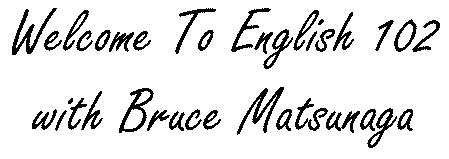
Home | Policy | Syllabus | Assignments | Links
Assignment Four: Revision & Reflection
Due Dates:
Draft of Revision & Reflection, 4/26
Polished Draft of Revision & Description, 5/1
Polished Reflection Letter, 5/10 (in my office between 2:40 – 4:30 pm in lieu of a Final Exam)
The Assignment
This assignment, the last in the course, asks you to review and reflect on the work you have done in ENG 101 and 102. Specifically, you are asked to do the following things:
The completed package, then, should include a reflection letter, a revision that you wrote specifically for this assignment along with a description and explanation of that revision, and any earlier version(s) of the paper that you handed in previously. The package also ought to include copies of any paper or revision referred to in the reflection letter, with passages referred to in the reflection letter clearly marked. All documents should be clearly labeled so that I can quickly determine the purpose of each item in the portfolio. Include any front or back material for the portfolio itself that you think will assist me in making this determination.
Note: you may turn in your reflection letter with your final portfolio package or at some time before or during the scheduled final exam period (held 5/10 in my office LL 317 2:40 – 4:30 pm).
Invention
Composing the Reflection letter:
The Reflection letter should clearly explain what you have learned in this class. Be as detailed as you can, using examples from your writing and from your partners' or my comments on your writing to illustrate facets of your learning. The letter should also tell me what each item in the portfolio demonstrates. Your reflection letter might also consider your future development as a writer, commenting on how you plan to use your rhetorical knowledge and your composing skills after class is over. The following questions should help you to compose the reflection letter:
Composing the account of your revision:
Once you have decided which paper you want to revise, ask your workshop partners to reread the paper and/or its first revision and to note places where its quality could be improved. Revise the paper. Then ask yourself the following questions:
Your analysis of the revision may contain the answers to these questions or any other comments that you think are relevant. Minimally, it should contain a list of the revisions you have made to the paper you decided to revise. Remember to include both the original and the revision of this paper in your completed portfolio.